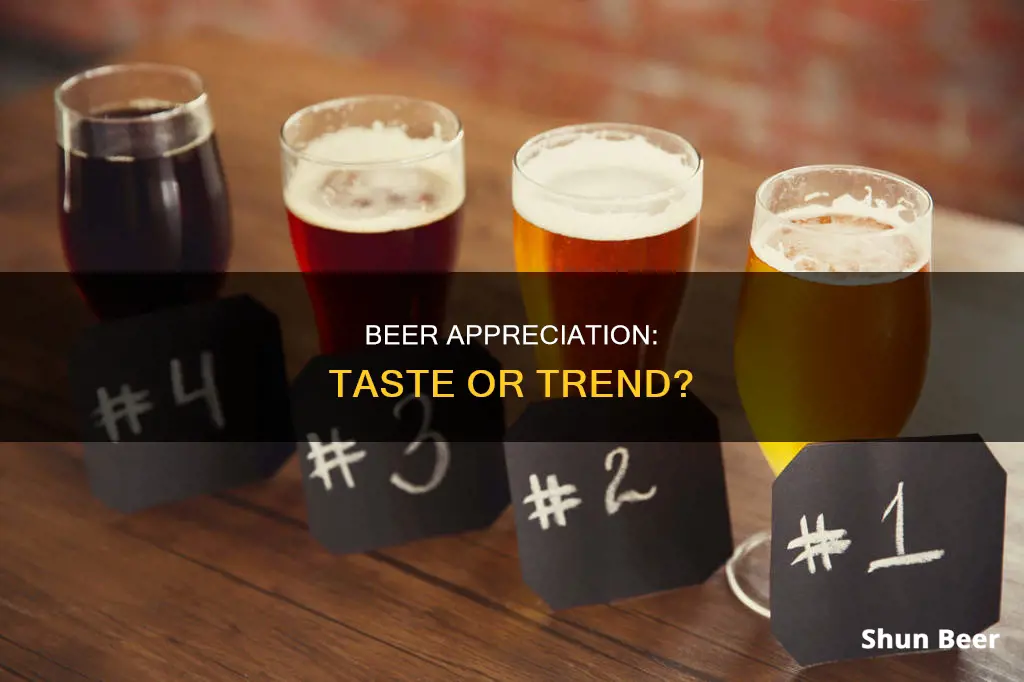
Whether people drink beer for the taste is a highly debated topic. Some people enjoy the taste of beer, while others find it repulsive. The answer to this question may lie in genetics, which influences how our brains process bitter-tasting and cold beverages. Beer's bitter taste is caused by hops, which trigger evolutionary wiring designed to keep us away from potentially dangerous food and drink. This trigger is stronger in some people than in others, leading to varying levels of aversion to the taste of beer. Additionally, the carbonation in beer activates our cold receptors, which also have genetic variations, contributing to individual differences in beer preference. While some people may acquire a taste for beer over time or find certain types of beer more palatable, others may never develop an appreciation for the beverage.
| Characteristics | Values |
|---|---|
| Beer's bitter taste | Triggers evolutionary wiring designed to keep us away from potentially dangerous food and drink |
| Taste buds | Identify specific flavours and send this data via nerves to the brain stem |
| Taste receptors | 25 different types for bitterness in the human body |
| Alpha and beta acids | Found in hops, bind to three of the 25 bitter receptors |
| Ethanol | Found in low concentrations in beer, binds to three of the 25 bitter receptors |
| Genetic functional polymorphisms | Genetic variations that influence how we perceive and tolerate bitter flavours |
| Number of taste buds | The more taste buds you have, the more likely you are to detest hoppy beers |
| Carbonation | Turns on our "cold" receptors |
| Countermeasures | Sweet and salty foods can help turn off the effects of bitter receptors |
| Beer preference | Acquired taste that comes with age |
| Beer preference | Influenced by sex and genetics |
What You'll Learn

Genetics and bitterness
The perception of bitterness is influenced by genetics, with 25 different types of taste receptors for bitterness in the human body, compared to only two types for saltiness. The bitter taste of beer is largely due to hops, which contain alpha and beta acids that bind to three of the 25 bitter receptors.
The ability to taste bitterness is influenced by genetics, with some people being more sensitive to bitter flavours than others. This sensitivity is due to variations in the TAS2R38 gene, which is responsible for encoding a receptor that detects bitterness. People with a higher number of taste buds are more likely to find beer too bitter. Additionally, carbonation in beer activates "cold" receptors, which also have genetic variations, further influencing the perception of bitterness.
The preference for bitter beverages, such as beer, may be influenced by genetics. A study of 370,000 participants in the UK Biobank found genetic variations associated with the consumption of bitter alcoholic and non-alcoholic beverages, such as coffee. However, no specific genetic locus for sweet beverage consumption was identified, suggesting that beverage choices are influenced by a complex interplay of taste, availability, and cultural preferences.
The evolution of bitter taste receptors is believed to be an adaptation for detecting poisonous substances, as many toxic compounds are bitter. This evolutionary wiring is triggered by the bitter taste of beer, which may explain why some people find it unappealing.
The Ultimate Beer Snorkel Experience: How Does It Work?
You may want to see also

Gender differences
While men and women may drink for the taste, there are gender differences in drinking patterns and alcohol-related consequences.
Drinking Patterns
Men are more likely to drink alcohol than women, with 54% of males and 32% of females over the age of 15 consuming alcohol worldwide. However, the gender gap in drinking patterns is narrowing, with alcohol consumption increasing among women but not among men. This trend is particularly evident among adolescents and emerging adults, where alcohol use among males has declined more than among females.
Alcohol-Related Consequences
Historically, alcohol-related harm has predominantly affected men. However, as gender gaps in drinking patterns narrow, women are increasingly experiencing alcohol-related health risks and consequences. For instance, research suggests that women have a faster progression of alcohol use disorder and are more susceptible to alcohol-induced liver inflammation, cardiovascular disease, memory blackouts, hangovers, and certain cancers.
In terms of driving under the influence (DUI), the gender gap is also narrowing, with a steeper increase in DUI arrests among women compared to men. Additionally, women are more likely than men to suffer consequences due to a spouse's, partner's, or family member's alcohol use.
Binge Drinking
Binge drinking rates differ between men and women, and the predictors and consequences of binge drinking vary by gender. While men binge drink more frequently than women, the media narrative of a growing epidemic of binge drinking among women is not supported by research evidence.
Binge drinking is associated with various adverse health consequences, such as liver disease, cardiovascular disorders, and neurocognitive impairments. However, the relationship between binge drinking and health outcomes can be complex and influenced by factors such as age, drinking culture, and individual characteristics.
Smoking and Binge Drinking
There is a strong association between binge drinking and smoking, with smokers having higher odds of being binge drinkers. This relationship is particularly pronounced among women, who often find it more challenging to quit smoking than men.
Liver Transplant and Alcohol: Is Drinking Beer Safe?
You may want to see also

Acquired taste
The taste for beer is often an acquired preference, with many people learning to appreciate its flavour as they get older. Beer is similar to wine, cheese, or spirits in that it comes in a variety of colours and flavours, and some people may need to try a diverse range of styles to find one they like.
There are many factors that influence a person's taste for beer, including their sex and genetics. Young women, for example, tend to be more averse to bitter flavours than young men, but this can change over time. Some people also have a gene that makes them more likely to dislike bitter flavours.
The number of taste buds in a person's mouth can also be an indicator of bitter sensitivity. The more taste buds a person has, the more likely they are to dislike hoppy beers. Beer's bitterness comes from hops, which contain alpha and beta acids that bind to bitter receptors in the human body, triggering an evolutionary warning system designed to keep us away from potentially dangerous food and drink.
However, bitter flavours can be counteracted by sweet and salty foods, which is why beer is often paired with beer nuts or tequila with salt. By cutting through the bitter taste, people can better appreciate the underlying flavours of the beer.
Beer and Running: Is It Safe to Run After Drinking?
You may want to see also

Alcohol dependence
The causes of alcohol dependence are multifaceted and vary from person to person. Genetic factors play a significant role, with heredity accounting for approximately 60% of the risk. Additionally, environmental factors, such as societal influences, family attitudes, and personal trauma, can contribute to the development of alcohol dependence. Mental health conditions, including depression, post-traumatic stress disorder (PTSD), and attention-deficit/hyperactivity disorder (ADHD), are also associated with an increased risk of alcohol dependence.
The effects of alcohol dependence extend beyond the individual, impacting their relationships, work, and financial situation. It can also lead to a range of serious health problems, including cancers of the mouth, throat, and breast, as well as bowel cancer, pancreatitis, high blood pressure, stroke, and coronary alcohol-related heart disease. Liver damage is a common consequence of prolonged heavy drinking, with seven out of ten people with alcoholic liver disease exhibiting alcohol dependency.
Treating alcohol dependence typically involves a combination of medication and behavioural therapy. Support groups and mutual-support groups can also provide valuable peer support during recovery. While setbacks are common, studies show that most people with alcohol dependence can reduce their alcohol consumption or stop drinking entirely with proper treatment.
It is important to note that alcohol dependence can develop even without extreme levels of drinking. Anyone who drinks regularly may exhibit some degree of alcohol dependency. Therefore, it is crucial to be mindful of one's drinking habits and to seek professional help if concerned about alcohol dependence.
Blue Moon Beer: Safe to Drink After Expiry?
You may want to see also

Taste buds
Our taste buds play a crucial role in how we perceive and enjoy beer. Within our taste buds are five types of taste cells that help us perceive salty, sweet, sour, umami (savory), and bitter flavours. When we take a sip of beer, the taste buds identify these flavours, and taste receptors send this data via nerves to the brain stem.
Beer's bitterness primarily originates from hops, and the alpha and beta acids found in hops, along with low concentrations of ethanol, bind to three of the 25 bitter receptors in our taste buds. This triggers a strong bitter taste signal to the brain.
The number of taste buds in one's mouth can be an indicator of bitter sensitivity. Individuals with a higher number of taste buds are more likely to dislike hoppy beers. However, it's important to note that bitter sensitivity can also be influenced by genetic factors.
Additionally, the carbonation in beer activates our "cold" receptors, which are temperature receptors that can also impact our taste perception. Similar to bitter receptors, cold receptors exhibit genetic variations, contributing to individual differences in beer preference.
While some people may enjoy the bitter taste of beer, others may find it unappealing due to their taste bud sensitivity or genetic variations in bitter and cold receptors.
Beer and Baseball: Drinking Culture in MLB Games
You may want to see also
Frequently asked questions
Yes, people do drink beer for the taste. Beer is like wine, cheese, or spirits—it comes in many different colours and flavours, and there is likely a beer out there for everyone.
The answer comes down to genetics, which influences how our brains process bitter-tasting and cold beverages. Beer's bitter taste triggers evolutionary wiring designed to keep us away from potentially dangerous food and drink, and this trigger is stronger in some people than in others.
Beer's bitterness largely comes from hops. The alpha and beta acids found in hops, as well as the low concentrations of ethanol in beer, bind to three of the 25 bitter receptors in the human body, signalling a strong bitter taste to the brain.
It may be an acquired taste. One commenter on Reddit said, "It didn't take long for the taste to grow on me enough that I could drink it without gagging... but it was a good year or two of large quantities of drinking beer regularly before I actually liked the taste."
Some popular beers among craft beer drinkers include:
- West End Draught (South Australian)
- Allagash White
- Blue Moon
- Hazy Little Thing from Sierra Nevada
- Lil Squeezy from Deschutes







